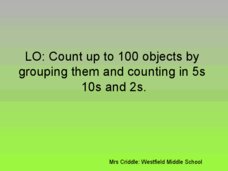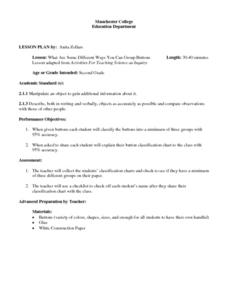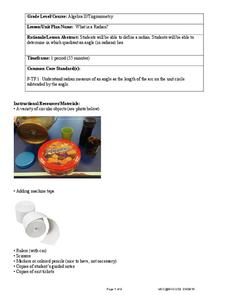Curated OER
Counting by Grouping Objects
Kids can count to 100 by 2's, 5's, and 10's, it's called counting by grouping. They are presented with a variety of counting tasks, they count each set of objects by 10's, 2's and 5's then discuss which method was quickest. A challenge...
Illustrative Mathematics
Sort and Count II
Capture the engagement of young mathematicians with this hands-on sorting activity. Given a bag of objects, students work independently sorting the items based on their physical attributes, counting to determine the size of each group....
Curated OER
Use Estimation to Compare Numbers
"Take a walk" with this worksheet and estimate how many birds, ants, turtles, flowers and children getting on a bus that you see. Based on the size of a single set of 10 objects, learners estimate how many are in the whole group. They...
Curated OER
Counting to Thirty
In this math worksheet, student practice counting up to 30 and writing the correct number. Students analyze 10 groups of objects. For each group, students count the shapes and write the number on the line.
Curated OER
Counting Numbers 0-30
Counting can be fun and it is always a good idea to begin counting practice with concrete objects. Kindergartners hear the story "Five Little Monkeys," then practice grouping, counting, and documenting (drawing) sets of five.
Curated OER
Sets Of
Represent multiplication as sets of items for beginners to this concept. They look at six familiar object sets and determine the total number of legs by counting the sets. There is some scaffolding here, as the first is done for them and...
Curated OER
What Are Some Different Ways You Can Group Buttons
Second graders classify and group buttons. They discuss how their buttons are alike and different, and identify the characteristics of their handful of buttons. Students then classify their buttons into three groups, and create a...
Teach Engineering
Energy Forms and States Demonstrations
Does a tennis ball have energy? What about a bowling ball? Demonstrate concepts of different forms of energy forms and states with a variety of objects. Using the equations for potential and kinetic energy,...
NASA
Foam Rocket
When going for distance, does it make a difference at what angle you launch the rocket? Teams of three launch foam rockets, varying the launch angle and determining how far they flew. After conducting the series of flights three times,...
Curated OER
Number Line Snacks: Compare Numbers to 10
Kindergarteners put Cheerios or cheddar fish on two number lines (up to 10 each) and identify which number the snack pieces indicate. They compare numbers after eating a few of each snack, and get an introduction to addition and...
DK Publishing
Addition: Count and Color, part 3
Approach addition with sets of objects to show scholars the operation visually. There are four sets of images here arranged as addends in an addition number sentence. Learners count them and color in the total in a final set. All answers...
Curated OER
Count by Grouping Into Tens
In this counting by grouping learning exercise, students group shapes into tens by circling either groups of 5 or ten in ech. A reference website for additional resources is given.
Curated OER
Multiplication as Repeated Addition
For beginners, present multiplication as repeated addition to give them a familiar context. They examine grouped sets of objects and add up the groups to get a total. Then, learners translate the addition sets to a basic multiplication...
Curated OER
Addition Grid
Which of these numbers add up to 20? Scholars find various addend pairs in a grid, circling those that add up to 20. There are many pairs they can find here, and the answer sheet offers some excellent kinesthetic practice ideas for...
West Contra Costa Unified School District
What Is a Radian?
Here's an algebra II activity that strives to make the concept of a radian less abstract and more conceptual. It takes a hands-on approach to exploring the idea of a radian and allows individuals to develop a definition of a...
Curated OER
Finding Volume
Sixth graders develop a rule for finding the volume of rectangular solids using colored cubes. They investigate the properties of solid figures and find the volume of an object by counting units. Students fill spaces with standard-sized...
Illustrative Mathematics
Tossing Cylinders
Everyone loves a lesson that involves throwing things around! To understand probability, your experimenters will predict how different cylinder-shaped objects will land when tossed. When the data is collected, they will calculate the...
Curated OER
Memories to Last: Observing Monuments
Students use scientific observation and inference to examine the Hazen Brigade Monument. In this observation lesson, students review the reasons for building monuments in society. Students then recall monuments they have seen and...
Curated OER
Group Triangles Into Fives Or Tens
In this grouping into fives and tens worksheet, 2nd graders group pictures of triangles by drawing circles around sets of ten. They work with 50 pictures of small, right triangles.
Curriculum Corner
“I Can” Common Core! 3rd Grade Math
Help third graders make sense of the Common Core math standards with this simple checklist. By rewording each standard as an I can statement, children are provided with clear goals to focus on as they participate in math lessons.
Inside Mathematics
Swimming Pool
Swimming is more fun with quantities. The short assessment task encompasses finding the volume of a trapezoidal prism using an understanding of quantities. Individuals make a connection to the rate of which the pool is filled with a...
Curated OER
Pi Day: The Other Math Holiday!
Happy Pi Day! This collection of games, experiments, and activities leads participants through an exploration of the many aspects and attributes of that mysterious quantity, pi. Activities range from using statistical...
Curated OER
Springtime Flower Fun
Students study directional skills and participate in a scavenger hunt to find flowers. They compare, group and classify the flowers by their similarities and differences.
Curated OER
The Number Partner
First graders study number pairs and identify number pairs that sum to numbers from 10 to 30. They use number pairs to solve addition and subtraction problems. They make sensible estimates and check the reasonableness of answers.























